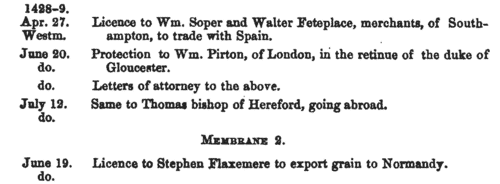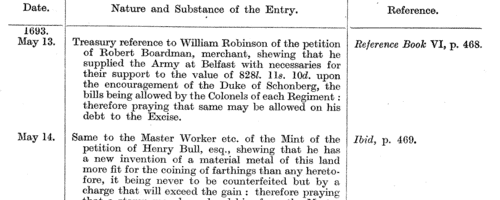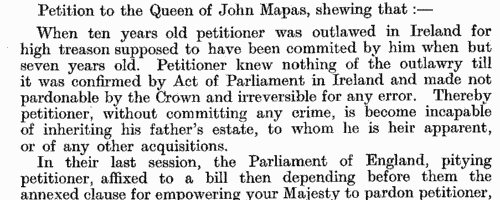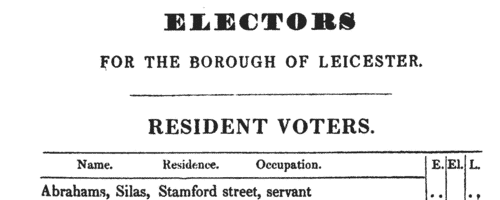Ghent Surname Ancestry ResultsOur indexes 1000-1999 include entries for the spelling 'ghent'. In the period you have requested, we have the following 28 records (displaying 1 to 10): Single Surname Subscription | | | Buying all 28 results of this search individually would cost £158.00. But you can have free access to all 28 records for a year, to view, to save and print, for £100. Save £58.00. More... |
These sample scans are from the original record. You will get scans of the full pages or articles where the surname you searched for has been found. Your web browser may prevent the sample windows from opening; in this case please change your browser settings to allow pop-up windows from this site. Liberate Rolls
(1260-1267)
These chancery liberate rolls of the 45th to 51st years of the reign of Henry III of England record the details of payments and allowances as part of the administration of government. Most entries start with the Latin words 'liberate', meaning 'deliver', or 'allocate', meaning allow. There are also 'contrabreves', warrants mainly to sheriffs of shires, assigning them tasks and allowing expenses. Most of the entries relate to England and Wales, but there are occasional references to Ireland and the English possessions in France.GHENT. Cost: £4.00.  | Sample scan, click to enlarge

| The English in France
(1440)
King Henry VI of England (one of the grandsons of Charles VI of France) claimed the throne of France (and quartered the fleurs-de-lis of France with the lions of England on the royal standard) as had his predecessors since Edward III, as descendants of Philip IV of France. The English had real power or influence in Brittany, Normandy, Flanders and Gascony, and actual possession of several coastal garrisons, in particular Calais, where the French inhabitants had been replaced by English. Henry VI came to the throne only seven years after his father had trounced the French at Agincourt; but his cousin, Charles VII, who became king of France in the same year, spent his long reign rebutting the English king's claim to his throne by territorial reconquest and consolidation. The English administration kept a series of records called the French Rolls. On these are recorded royal appointments and commissions in France; letters of protection and safe-conduct to soldiers, merchants, diplomats and pilgrims travelling to France from England and returning, and to foreign legations. There are also licences to merchants to export to the Continent, and to captains to transport pilgrims. As Henry VI's reign progressed, and the English grip on northern France loosened, the French Rolls also increasingly include entries concerning the ransoming of English prisoners.GHENT. Cost: £6.00.  | Sample scan, click to enlarge

| Treasury Books
(1693-1696)
Records of the Treasury administration in Britain, America and the colonies, from January 1693 to March 1696. These also include records of the appointment and replacement of customs officers such as tide waiters and surveyors. The calendar was prepared by William A. Shaw for the Lords Commissioners of His Majesty's Treasury and published in 1935, from letters patent, privy seals, royal sign manuals and warrants, treasury warrants, commissions, orders, letters, memorials, reports and other entries, all not of the nature of Treasury Minutes. GHENT. Cost: £4.00.  | Sample scan, click to enlarge

| State Papers Domestic
(1702-1703)
The State Papers Domestic cover all manner of business relating to Britain, Ireland and the colonies, conducted in the office of the Secretary of State, as well as other miscellaneous records. 1 March 1702 to 31 May 1703. The calendar was prepared by Robert Pentland Mahaffy, with certain classes of document extracted and placed in separate appendices (called Tables): I, caveats; II, church and university appointments, &c.; III, commissions, warrants for commissions, notes of commissions and notes of warrants for commissions in the English army for 1702; IV, lord lieutenants and deputy lieutenants; V, Irish warrants; VI, weekly lists of ships of the Home Fleet with their stations and orders; VII, passes, notes of passes, post warrants and licences of absence; VIII, orders on petitions; IX, Scottish warrants and commissions; and X, miscellaneous royal warrants (to the Attorney or Solicitor General; in criminal cases; diplomatic; military warrants; miscellaneous warrants; secretary's warrants, allowance of bills, &c.; and notes of warrants for the appointment of almsmen). The source material in the Public Record Office that he drew on in making this compilation is referenced throughout, and is from the State Papers Domestic (and Military, Naval, Signet Office, Various, and Letter Books and Entry Books), State Papers Scotland (Correspondence, Letter Books and Warrants), State Papers Ireland (and King's Letter Books), and State Papers Channel Islands.
GHENT. Cost: £4.00.  | Sample scan, click to enlarge

| Treasury and Customs Officials, Officers and Pensioners
(1717)
Government accounts, with details of income and expenditure in Britain, America and the colonies
GHENT. Cost: £6.00.  | Sample scan, click to enlarge

| Treasury and Customs Records
(1718)
Government accounts, with details of income and expenditure in Britain, America and the colonies
GHENT. Cost: £4.00.  | Sample scan, click to enlarge

|  Apprentices registered in Leicester
(1766) Apprentices registered in Leicester
(1766)
Apprenticeship indentures and clerks' articles were subject to a 6d or 12d per pound stamp duty: the registers of the payments usually give the master's trade, address, and occupation, and the apprentice's name, as well as details of the date and length of the apprenticeship. There are central registers for collections of the stamp duty in London, as well as returns from collectors in the provinces. These collectors generally received duty just from their own county, but sometimes from further afield. The indentures themselves can date from a year or two earlier than this return. (The sample entry shown on this scan is taken from a Salop return. Each entry has two scans, the other being the facing page with the details of the indenture, length of service, and payment of duty.) IR 1/56GHENT. Cost: £8.00.  | Sample scan, click to enlarge

|  Masters of apprentices registered in Leicester
(1766) Masters of apprentices registered in Leicester
(1766)
Apprenticeship indentures and clerks' articles were subject to a 6d or 12d per pound stamp duty: the registers of the payments usually give the master's trade, address, and occupation, and the apprentice's name, as well as details of the date and length of the apprenticeship. There are central registers for collections of the stamp duty in London, as well as returns from collectors in the provinces. These collectors generally received duty just from their own county, but sometimes from further afield. The indentures themselves can date from a year or two earlier than this return. (The sample entry shown on this scan is taken from a Salop return. Each entry has two scans, the other being the facing page with the details of the indenture, length of service, and payment of duty.) IR 1/56GHENT. Cost: £8.00.  | Sample scan, click to enlarge

|  Apprentices and clerks
(1793) Apprentices and clerks
(1793)
Apprenticeship indentures and clerks' articles were subject to a 6d or 12d per pound stamp duty: the registers of the payments usually give the master's trade, address, and occupation, and the apprentice's name, as well as details of the date and length of the apprenticeship. 2 January to 15 June 1793. IR 1/35GHENT. Cost: £8.00.  | Sample scan, click to enlarge

| Leicester Poll Book: Resident Non-Voters
(1832)
A poll was taken on 12 and 13 December 1832 for the election of two representatives in Parliament for the borough of Leicester, the candidates being William Evans esquire (E.), Wynn Ellis esquire (El.) and J. W. Boughton Leigh esquire (L.). This poll book, printed by J. G. Brown of Leicester, gives the name, residence and occupation of all the electors, divided into four categories: resident voters, non-resident voters, resident non-voters, and non-resident non-voters. For those who polled, their votes are marked on the right hand side. Under the 1832 Reform Act the franchise within the borough had been extended to all (adult male) owners or tenants of property worth £10 a year or more.GHENT. Cost: £4.00.  | Sample scan, click to enlarge

|
Research your ancestry, family history, genealogy and one-name study by direct access to original records and archives indexed by surname.
|













